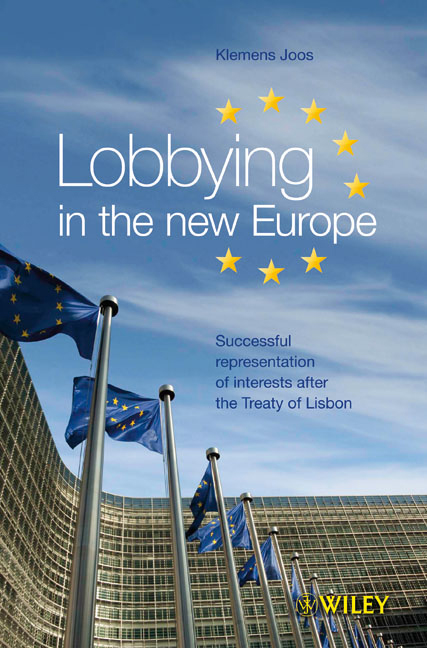Lobbying in the new Europe

Vorwort / Preface (EN)
Signed by the European Union’s heads of state and government on the 13th of December 2007, the Treaty of Lisbon finally entered into effect after considerable delay on the 1st of December 2009, giving the EU a new primary legal framework. One aim of the Treaty was and is to ensure ‘Europe of the 27’ is able to act effectively in what is a rapidly changing environment, in particular in the face of global crises and challenges. Another is to strengthen and develop democracy in Europe and relations between the European Union and its citizens. A struggle between different and in some cases opposing interests in the political decision-making process is part of every pluralist democracy. Siim Kallas, for example, EU Commissioner and one of the figures behind the European Transparency Initiative, believes that ‘lobbying is entirely normal in a democracy. I find it perfectly natural that citizens and organisations should seek to influence decisions which could potentially affect them.’ Decisions made at a European level have far-reaching consequences for citizens and businesses in the Member States: around 80 percent of the laws and regulations which enter into effect in EU Member States now originate in Brussels rather than in the national parliaments. In the field of commercial law, the proportion of regulations which come from Europe is even higher. The Treaty of Lisbon and the increase in EU competencies and importance it brings will further strengthen the defining influence of Europe.
As important as European processes and procedures are, they nevertheless appear impenetrable and inaccessible to many company heads. Businesses therefore miss a great many chances and opportunities which a deeper understanding of and strong presence in the ‘capital of Europe’ could offer them. At stake are not simply the conditions for companies in one Member State, but rather those governing an internal market with around 500 million consumers. No company can now afford to leave the consideration of its interests by the legislature and executive to chance. Effective lobbying at a national level has always been key to the long-term success of major businesses and is even more important in 27-state Europe. Even if a company has a sufficiently good network in its ‘home Member State’, this strong position in just one of 27 Member States is not enough to ensure success in a united Europe – especially not in the light of the changes (such as those in European voting procedures) introduced by the Treaty of Lisbon.
This book is designed to guide the reader through ‘Brussels affairs’ and offer an insight into a complex yet diverse and interesting business and service. The seven parts which follow seek to explain the content and context of successful representation of company interests. An exhaustive description detailing all aspects of the subject is of course not possible here – such a work would take on almost encyclopaedic proportions, for lobbying occurs at the interface of law, politics and business, which are in themselves highly complex fields. Instead, the book aims to set out the common threads; numerous references to primary and secondary literature will enable the reader to explore areas of particular interest in more detail. The book is structured as follows:
- Part 1 introduces a number of critical questions in the general ‘lobbying debate’. What is the function of lobbying and what role do lobbyists have in a democratic system? What democratic legitimisation is there for presenting business interests to the legislature and executive?
- The main section of the book (Parts 2 to 6) is designed as a guide for businesses and lobbyists seeking to contribute to European decisions and law-making. What is specific to lobbying at a European level, in particular following the changes introduced by the Treaty of Lisbon? What official and unofficial rules should be obeyed? What are the ‘tools’ used by a lobbyist in practice and, most importantly, what strategic approach should a business take to lobbying in order to ensure permanent, long-term success in Brussels? A detailed case study illustrates theory in practice.
- Part 7 then compares the situation on the other side of the Atlantic: what is specific to lobbying in the USA and what does this suggest in terms of trends and future scenarios in Europe?
My doctoral thesis, published in 1998, was a pioneering work in the academic analysis of lobbying at European Union institutions. This book, on the other hand, is not so much an academic presentation of the subject as a practical tool which the reader can use in a variety of different ways:
- The executive summaries are specifically designed for readers with less time. A recap of the key questions for the relevant chapter is followed by a summary of the main points in just a few pages. Readers with an hour can thus gain an overall picture of the basic points of the book.
- Those with more time can also – when reading the executive summaries – consult the book’s numerous figures and tables (see also the List of Figures and Tables). The graphics further illustrate and clarify the content of the individual chapters.
- The main section of the book – Parts 2 to 6 – is designed for professionals in the field wishing to go a little deeper in medias res.
- Parts 1 and 7 are important but not absolutely essential to an understanding of the book as a whole. Even readers with less time should however also look at Part 1 Section A. I., which includes explanations and definitions of the terms public relations, public affairs, lobbying and governmental relations.